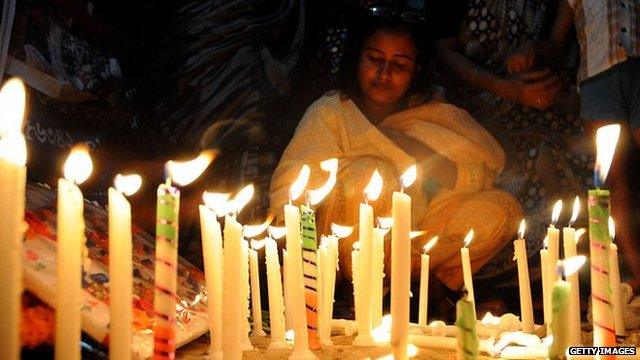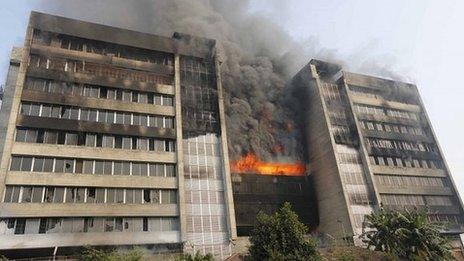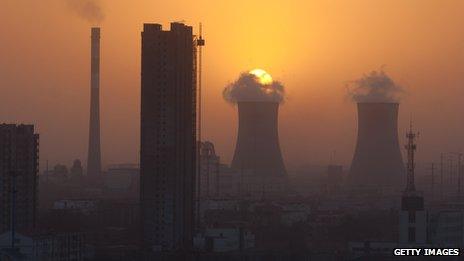The year in business: 2013
- Published

The collapse of the Rana Plaza factory was one of the world's worst industrial accidents
After years when the failures of the financial derivatives industry dominated business headlines, a shocking tragedy in a much older, much more basic industry - clothes making - was the most momentous event of 2013.
In April, more than 1,100 people were killed when the Rana Plaza factory in Bangladesh collapsed. The workers there had been making clothes for many big global brands.
It quickly emerged that the building had actually been converted from a shopping centre and had never been designed to cope with the weight of heavy machinery, hundreds of workers or the extra two stories later built on top of the original six stories.
It also emerged that big cracks had appeared in the building the day before the disaster.
Yet workers had entered the building anyway, saying they had been threatened with a big loss of earnings if they didn't get on with their work.
The disaster raised difficult questions for the building's owners, the Bangladesh government, global clothing brands and consumers of cheap clothes in rich countries.
Everyone agreed it was a scandal that the safety of human beings could still be treated with such contempt in the 21st century.
But who was to blame and what should happen next to improve things?
'They need these jobs'
Workers' rights groups insisted that the answer was certainly not any sort of consumer boycott.
Kalpana Aktar of the Bangladesh Centre for Worker Solidarity in Dhaka told me people should continue to buy clothes made in Bangladesh.

Bangladesh needs 'jobs with dignity,' says Kalpona Akter
"These jobs are so important for these female workers who are working in this industry."
"We are talking about four million workers and they are young. They need these jobs because they need the economic freedom.
"But we need these jobs with dignity - our workers need a safe working place, decent wages and a union voice."
Kalpana Aktar says shoppers in rich countries should write to retailers to persuade them to take part in an accord set up after the disaster, under which some retailers have made legally binding commitments to fund safety inspections and give workers a chance to negotiate on working conditions and wages.
Brands who have already signed up include H&M, C&A, Zara, Primark and Tesco.
An alternative plan to improve conditions, known as the Alliance, has been joined by many US retail chains including Wal-Mart, Target and Gap.
Brands 'should do more'

Last month a fire gutted a huge clothing factory in Bangladesh which employed 18,000 workers, nobody was reported hurt
The first inspections under this scheme do already appear to have led to improved safety in some Bangladesh factories.
But Kalpana Aktar argues that this Alliance "is not strong enough".
And - eight months after the tragedy - she says no significant changes to improve safety have been initiated by the Bangladesh government or factory owners.
Global clothing brands have flocked to Bangladesh in recent years because it has millions of skilled workers, willing to work for the lowest wages in the world.
Bangladesh is estimated to produce more than 5% of the world's garments.
Subcontracting to sub-standard factories often seems to happen without the knowledge of the big brands because Bangladesh's purpose-built factories simply cannot cope with demand.
Many critics say the brands should do more to check how their products are made.

Will the east turn red? Some worry China is vulnerable to a property price bubble
Chinese housing worries
Bangladesh is a huge clothes export machine, but China remained last year the most powerful exporting nation overall, maintaining growth of over 7%, according to official figures.
Close attention was paid to changes at the top of China's ruling Communist Party. The leadership is generally refreshed every 10 years.
In the past year, the new regime consolidated its hold on power but there was little sign of the new leadership allowing any more openness.
Websites of western media groups were censored when they wrote stories about corruption allegations.
Concern continues that China will be the next economy to suffer the impact of the bursting of a house price bubble.
Among the pessimists is Anne Stevenson-Yang of J Capital Research in Beijing.
"The economic path forward is not really a pleasant one. China has insanely over-invested, it's really quite tragic," she says.
"I don't think I've been to a single city in China for the last two years that doesn't have groaning empty real estate.
"Tower after tower that is utterly dark, empty ballparks and museums and libraries."
Demand from China seems to have been a major reason why the online virtual currency, bitcoin was one of the top investments of 2013.
Bitcoin's value soared from $13 in January to more than $1,000, before then halving in price after reports that Chinese exchanges would no longer accept them.
Stability fears recede
On more conventional markets it was a very good year, as growth picked up in the United States, while emergency stimulus of cash by the US central bank continued.
The Dow rose to a record high, gaining around 25% in 2013. The gains were significant after 13 years where average shares prices had effectively stood still.
Investors still had plenty in the background to worry about. American politics frequently was in stalemate, leading to a partial temporary government shutdown.
The total US government debt sold to the public kept rising, and is now at $12.7 trillion.
The news from Europe changed little during the year, although one of the most troubled nations, Spain did manage to return to growth, even with unemployment still more than 25%.
Rightly or wrongly, fear about the stability of banks and government debts in western nations gave way to milder concern.
Many politicians hope that will provide a springboard for more confident consumers and business in 2014.
You can listen to Martin Webber's review of the world in business in 2013 in World Business Report on BBC World Service.
- Published24 December 2012
- Published29 December 2011
- Published27 December 2010